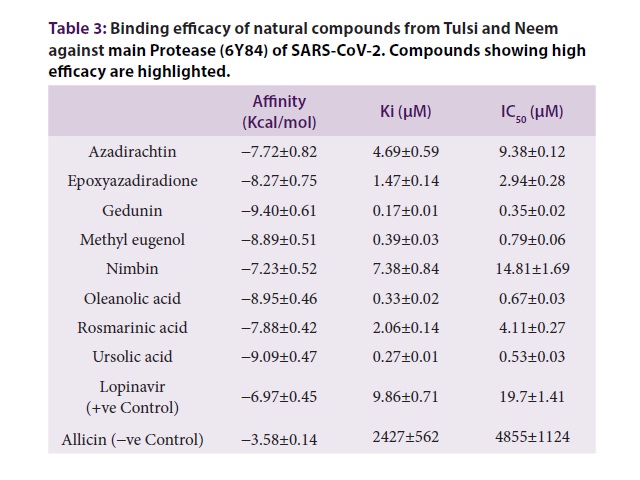Molecular Docking of Natural Compounds from Tulsi (Ocimum sanctum) and neem (Azadirachta indica) against SARS-CoV-2 Protein Targets
DOI:
https://doi.org/10.5530/bems.6.1.4Keywords:
Protease inhibitors, RNA polymerase inhibitors, Coronavirus, Covid-19, Antiviral drugs, SARS-CoV-2, Viral entry, GlycoproteinAbstract
Background: Antiviral activity of tulsi and neem extracts are widely reported. Selected natural compounds from tulsi and neem were hence screened for their efficacy against SARS-CoV-2 targets. Materials and Methods: Using molecular docking tools, the binding efficacy ofnatural compounds from tulsi and neem were tested against three key SARS-CoV-2 targets i.e., 1) surface glycoprotein (6VSB) responsible for viral attachment, 2) RNA dependent RNA polymerase (6M71) responsible for viral replication and 3) main protease (6Y84) responsible for viral replication. Results: Methyl eugenol, oleanolic acid and ursolic acid had high binding efficacy against surface spike glycoprotein and RNA polymerase of SARS-CoV-2. Epoxyazadiradione, Gedunin, Methyl eugenol, Oleanolic acid and Ursolic acid showed high binding efficacy against the main protease of SARS-CoV-2. Binding efficacy of natural compounds from tulsi and neem was superior to that of the standard drugs Lopinavir/Ritonavir and Remdesivir. Conclusion: Natural compounds from tulsi and neem have high binding efficacy against SARS-CoV-2 targets involved in viral attachment and replication, hence will be useful in the management of infection caused by SARS-CoV-2.










